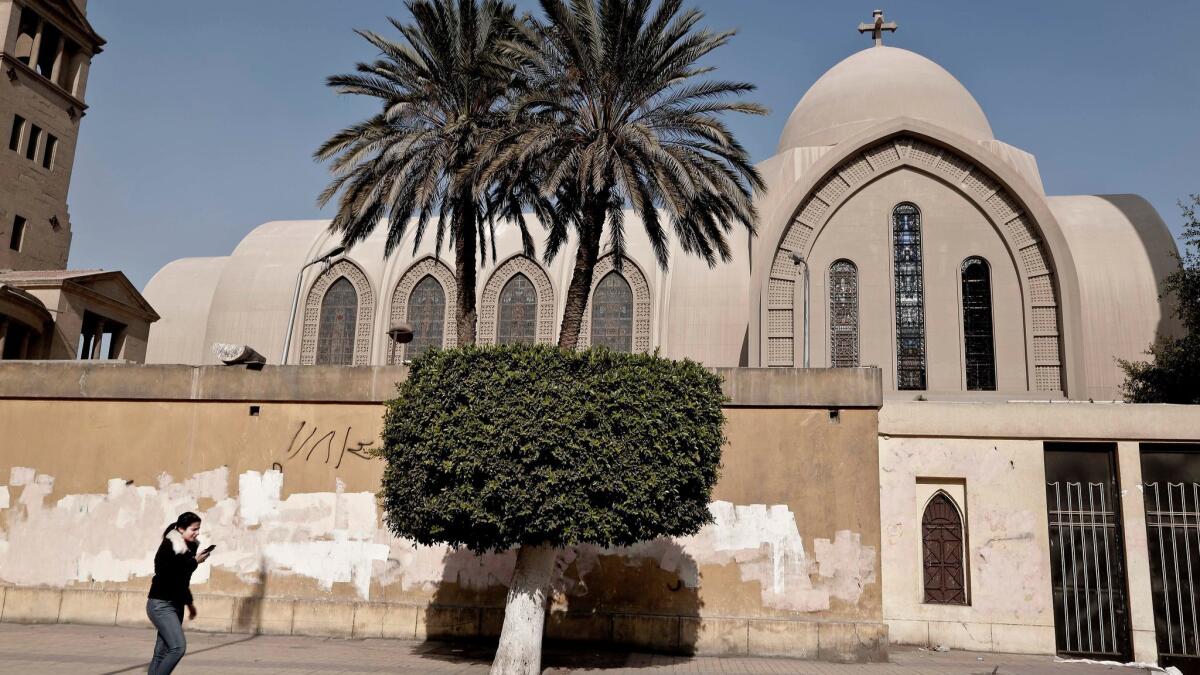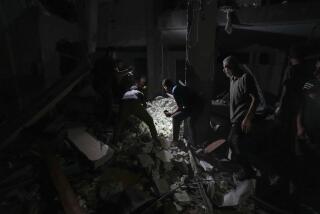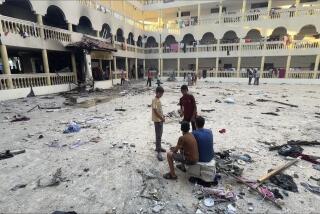Bombing at Egypt’s main Coptic Christian cathedral kills 25

- Share via
Reporting from Erbil, iraq — In the rubble outside Egypt’s main Coptic Christian church late Sunday, a crowd held a candlelight vigil for the 25 worshipers killed in a bombing at St. Mark’s Cathedral earlier in the day. The explosion in a chapel adjacent to the cathedral left pews overturned, the floor bloody, strewn with glass and other debris, according to images posted online.
“She died a martyr,” Monika Athnasious Botros wrote on Facebook, posting a photo of her elderly mother and, hours later, a photo of the victims’ body bags at a nearby hospital. She said the bodies had been left on the floor due to a lack of space in the morgue.
For the record:
3:35 a.m. June 1, 2025An earlier version of this article said that about two dozen Copts died in May 2011 during a downtown Cairo protest. They died in October that year.The earlier version also said that two Copts were killed outside St. Mark’s Cathedral in 2013. One person was killed outside the church when a funeral for four other Copts came under attack; the second victim died in fighting in a village.
She and other Coptic Christians blamed the government for failing them.
“It is a corrupt regime,” Botros said in a Facebook video from the hospital.
The church attack was the second bombing to hit Cairo in recent days. On Friday, the militant Islamic Hasm group claimed responsibility for a blast at a police checkpoint on the road leading to the Pyramids that killed six officers.
The bombings come at a time of turmoil for Egypt, which has been grappling with Islamic extremists, mostly to the north in the Sinai Peninsula, facing an economic crisis and seeing a growing security crackdown accompanied by alleged human rights violations.
No one claimed responsibility for Sunday’s attack on the cathedral, which wounded 49, many of them women and children. It occurred near the end of services at 10 a.m., when the chapel was packed, on a national holiday marking the birth of Islam’s Prophet Muhammad.
In response to the bombing, Egyptian officials cancelled celebrations marking the prophet’s birthday. Grand Mufti Shawki Allam, among the highest religious authorities in the country, issued a statement condemning the attack as “despicable,” noting that Islamic law forbids targeting churches. He urged all Egyptians to “stand united in the face of terrorism.”
U.S. Secretary of State John Kerry spoke with Egyptian Foreign Minister Sameh Shoukry “to express our deepest condolences to the families of the victims and our best wishes to those who must now recover from their injuries,” according to a statement.
“The United States will continue to stand with the people of Egypt as they face threats from terrorist organizations and work to achieve a stable, secure, and prosperous future,” said State Department Spokesman John Kirby.
St. Mark’s Cathedral is the headquarters of the Coptic Orthodox Church and the home of its leader, Pope Tawadros II, who was traveling in Greece on Sunday.
About 10% of Egypt’s 92 million people are Coptic Christians, making the group the country’s largest religious minority.
Human Rights Watch has noted growing religious intolerance and sectarian violence against Egypt’s Coptic Christians in recent years.
In a wave of attacks five years ago, their churches, homes and businesses were burned. In January, 23 were killed in a church bombing in the northern city of Alexandria, and about as many died in May during a downtown Cairo protest.
During another series of attacks in 2013, two Copts were killed outside St. Mark’s when locals clashed with those mourning the death of four other Copts killed in religious violence earlier that year.
Father Boules Halim, a spokesman for the Coptic Church in Cairo, said most of the victims of Sunday’s attack were women and children. He declined to comment on reports that a woman had been seen leaving a bag in the chapel before the explosion, saying such eyewitness accounts had not been confirmed by authorities.
Halim said the Egyptian prime minister and minister of the interior both responded to the scene immediately, and that security forces “realize the dangers we are facing.”
“The police and the military, alongside the church, are targeted,” he said, adding, “terrorism is an undeniable threat to the entire country.”
He said churches would work with authorities to increase security in coming days.
“We are not concerned nor do we fear these attacks. The church is in God’s protection and we are used to giving martyrs to our country,” Halim said.
Cairo International Airport declared a state of emergency following the bombing Sunday, with heightened security. Some Egyptian lawmakers called for a nationwide state of emergency.
President Abdel Fattah Sisi instead declared a three-day state of mourning for those killed in the bombing, sought to reassure the public that they were safe and vowed to bring the attackers to justice.
“The pain felt by Egyptians now will not go to waste, but will result in an uncompromising decisiveness to hunt down and bring to trial whoever helped through inciting, facilitating, participating or executing this heinous crime,” Sisi said in statement released late Sunday.
Protesters who tried to enter St. Mark’s Sunday afternoon, saying they wanted to pray for the victims, were barred by riot police. Many chanted, “The people demand the fall of the regime!” the rallying cry of the Arab Spring uprising five years ago that helped end President Hosni Mubarak’s 30-year rule.
When pro-regime newscasters arrived, they were chased and beaten, according to images posted online.
Sisi, a former general, came to power three years ago with support from Christians after the ouster of Muslim Brotherhood leader and elected president Mohamed Morsi. Sisi’s government has since cracked down on freedom of expression and has been accused of human rights violations, jailing activists, journalists and other critics.
The day before a planned protest against the regime last month, police rounded up alleged Muslim Brotherhood members accused of planning an attack. The protest fizzled.
Human rights groups called on the regime Sunday to do more than negotiate an uneasy peace among religious groups, as they have in the past.
“The Egyptian authorities must do everything in their power to ensure that the investigation they have announced into today’s attack is effective, independent and impartial and brings to justice those responsible,” said Philip Luther, research and advocacy director for the Middle East and North Africa at Amnesty International. “They must send a message that attacks targeting religious minorities will not be tolerated.”
A Times special correspondent reporting from Cairo contributed to this article.
MORE WORLD NEWS
Turkey’s ruling party moves to tighten Erdogan’s grip on power
Supposedly defeated, Boko Haram blamed for killing 30 in suicide attack
In the battle for control of key oil installations in Libya, a military man takes center stage
UPDATES:
1:30 p.m.: This article was updated throughout with Times staff reporting.
3:50 a.m.: This article was updated with the latest death toll and quotes from eyewitnesses.
This article was originally published at 2:15 a.m.
More to Read
Sign up for Essential California
The most important California stories and recommendations in your inbox every morning.
You may occasionally receive promotional content from the Los Angeles Times.














